Tension is in the air in Swellendam after two big protests in the area, over the municipality’s indigent policy and claims that those in the town’s richer community receive better municipal services than those living in the poorer areas.
Swellendam, in the Overberg region, is situated halfway between George and Cape Town. In addition to the main town of Swellendam and the suburb of Railton, the municipality includes Barrydale, Suurbraak, Buffeljagsrivier and Malgas.
The town is divided not only along the N2 highway, but racially too. Its white population lives in the main town, which has shopping malls, good restaurants and five-star hotels. The roads are wide and largely pothole-free.
On the other side of the N2, in the suburb of Railton, the roads are much narrower and potholes are prevalent. The town’s informal settlement of Majoks is hidden behind Railton’s White City. Here, rubbish is dumped on street corners and cars drive on pavements to avoid bumping into each other in the narrow streets.
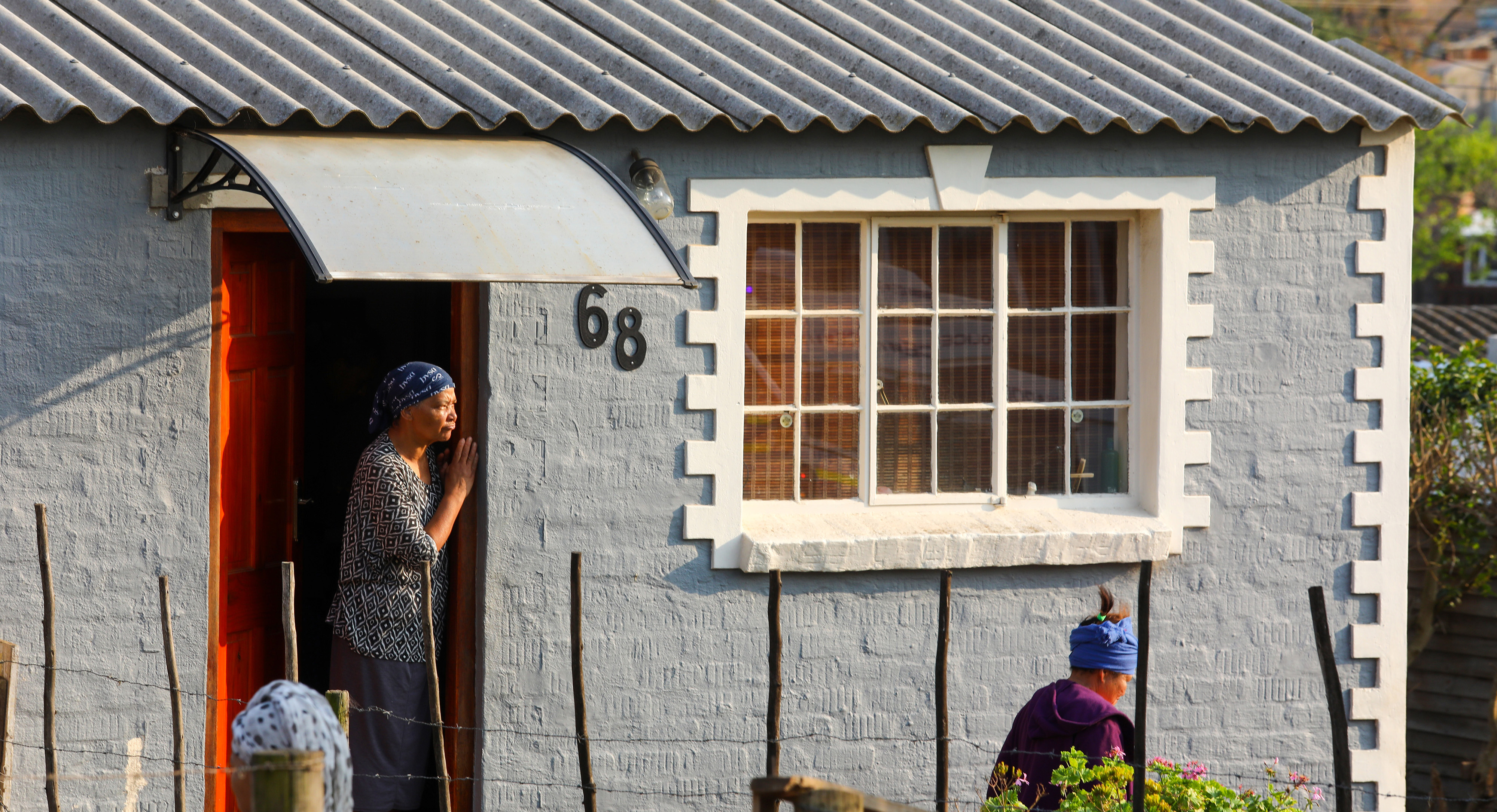 A resident watches the march from her home in Railton, Swellendam. (Photo: Shelley Christians)
A resident watches the march from her home in Railton, Swellendam. (Photo: Shelley Christians)
Taxis ferry residents to and from the town’s economic centre to their homes across the N2 highway.
In mid-August, residents marched to the municipal building to protest against the changes to the municipality’s indigent policy that granted the poorest residents 50 free units of electricity a month and 67 free litres of water per day. The municipal building was torched and several shops looted in the protest.
Read more in Daily Maverick: A day of chaos – Swellendam protesters torch municipal offices over ‘racism’, service delivery neglect
Then on 30 August, a group of about 300 residents marched again to the municipality, with several demands, which included:
- The municipality’s amended indigent policy to be reviewed after more public participation;
- The immediate removal of an “unregulated” R11.62 added to residents’ municipal bills to repair potholes; and
- For streetlights to be put off during the day to conserve electricity.
Read more in Daily Maverick: Swellendam protestors demand end to indigent policy, improved services — DA touts political meddling
In a 10-page letter, Swellendam’s mayor, Francois du Rand of the DA, replied to the points made in the memorandum. He went into great detail about the history of South Africa’s indigent policies. When it came to electricity tariffs, he said Swellendam used guidelines determined by the National Energy Regulator of South Africa.
“It would help if you were holding the ANC and Eskom accountable. Eskom’s failure to provide electricity to all South African citizens is primarily due to ANC corruption and mismanagement,” Du Rand wrote.
Read his full response here.
***
After the protest on 30 August, Daily Maverick spent time in the area speaking to residents and roleplayers.
Mareleze Windvogel (30) and her father Johannes (70) live in White City, Railton. Their house was given to the family in 1993 by the apartheid government. Mareleze, a seasonal farmworker who is currently unemployed, was at both protests.
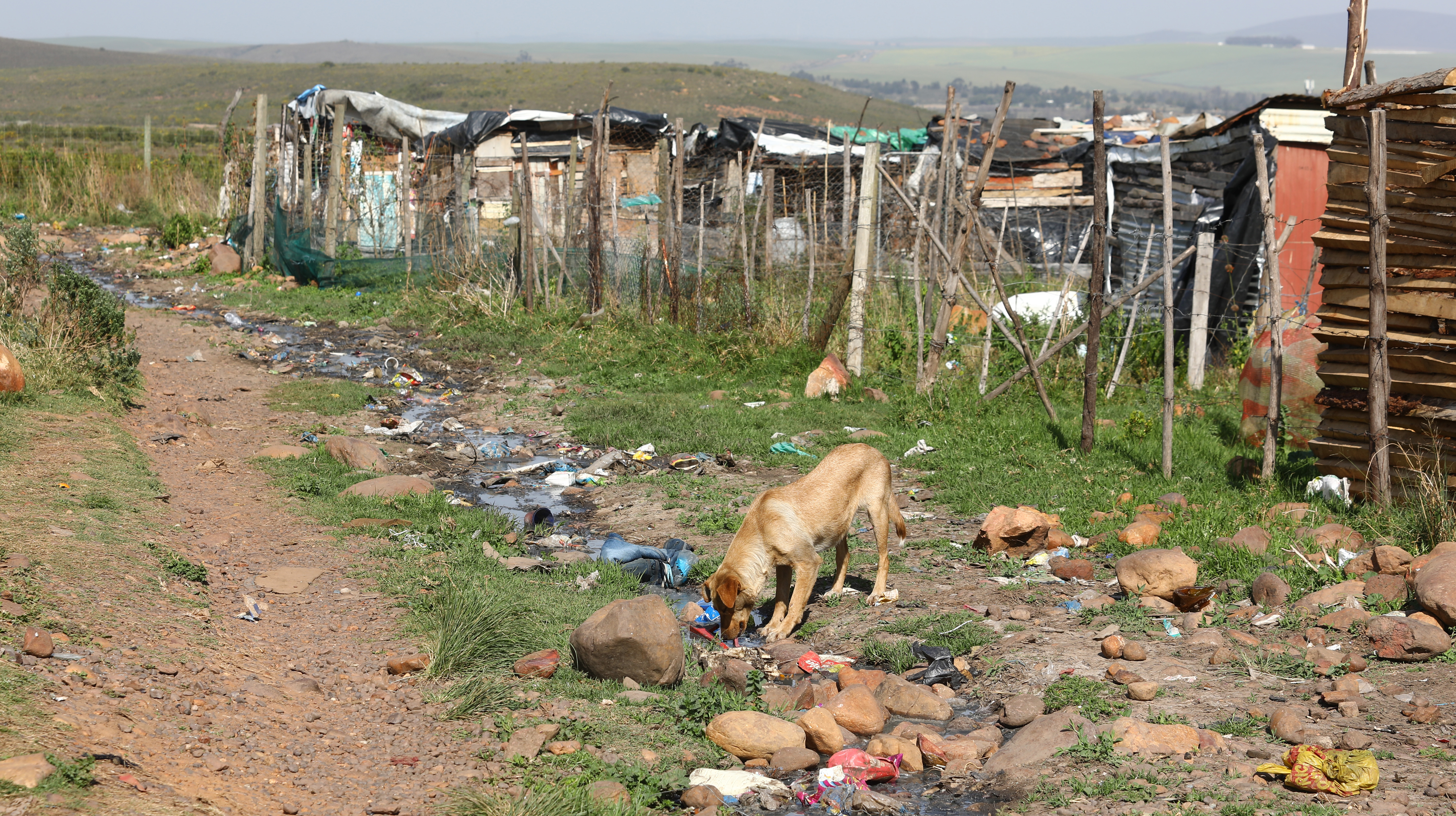 A dog drinks from a stream of sewage in Plakensplek, Swellendam. (Photo: Shelley Christians)
A dog drinks from a stream of sewage in Plakensplek, Swellendam. (Photo: Shelley Christians)
“The people living here at the back are in terrible conditions. There are children too,” said Johannes, a former member of the United Democratic Front who spent time on Robben Island for his involvement in the struggle against apartheid.
He relies on his pension payment to support his family when his daughter does not work. During Daily Maverick’s visit, he and his daughter were making a fire to cook food, as they had no money for electricity.
They locked up 107 people that were innocent. And in this cell at Swellendam Police Station, there were 23 people in one cell where there were 15 women.
Mareleze said, “I’m unemployed at the moment — he’s the only breadwinner in the house. If we can’t pay this month, our electricity gets blocked for the whole month.”
The smell of smoke clung to their home and Mareleze told Daily Maverick: “At the moment, we have to cook outside because we don’t have money to buy electricity because next week is [pension] grant day.”
When asked about the service in the municipality, Johannes said: “The municipality… all those whites are racist.”
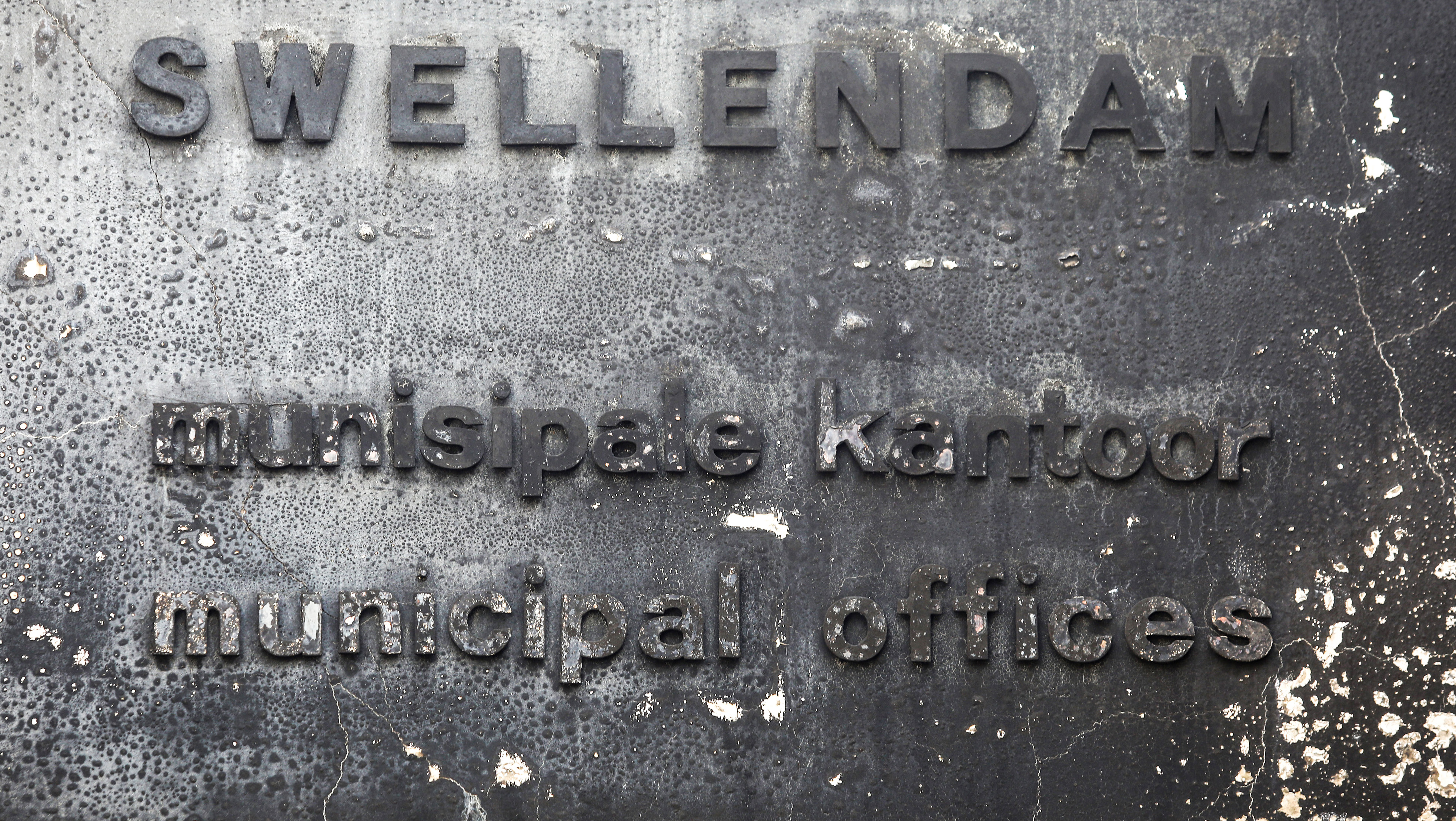 The municipal building in Swellendam was burnt down by protesters on 16 August. (Photo: Shelley Christians)
The municipal building in Swellendam was burnt down by protesters on 16 August. (Photo: Shelley Christians)
He did not substantiate his claim. Mareleze added: “Their behaviour is really bad. When the first peaceful protest happened, they were very ugly towards the people who live here at the back and even against us coloured people.
“[They said], ‘Go, you dogs, what are you doing in our town?’
“And then the second thing they did, they locked up 107 people that were innocent. And in this cell at Swellendam Police Station, there were 23 people in one cell where there were 15 women. Some of the women had their periods; there were no facilities for them. There were no toilets, no washcloths; the conditions were terrible. The police shot first at these people. People suffer here and the electricity is very expensive.
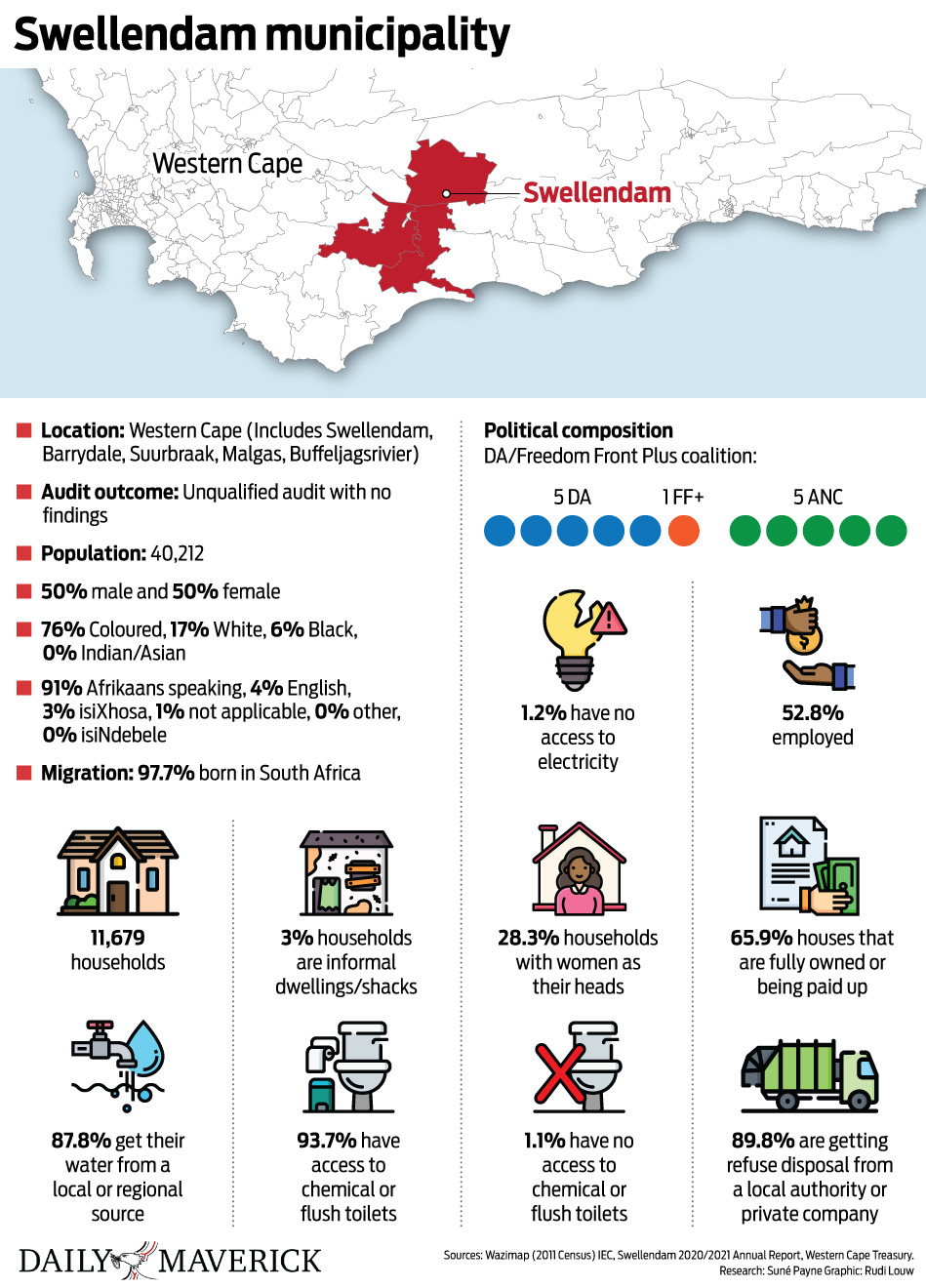
“At this point, I feel like my father fought for nothing because I have nothing at the end of the day because people are still doing the same thing like they did in the past.”
***
Sydney Setiera, a former councillor in the municipality for the ANC, described the town as a “peaceful place”. Setiera had lived his whole life in Swellendam.
“The poverty … here is huge,” Setiera said. “The only thing we can do is work together for a better future in Swellendam.”
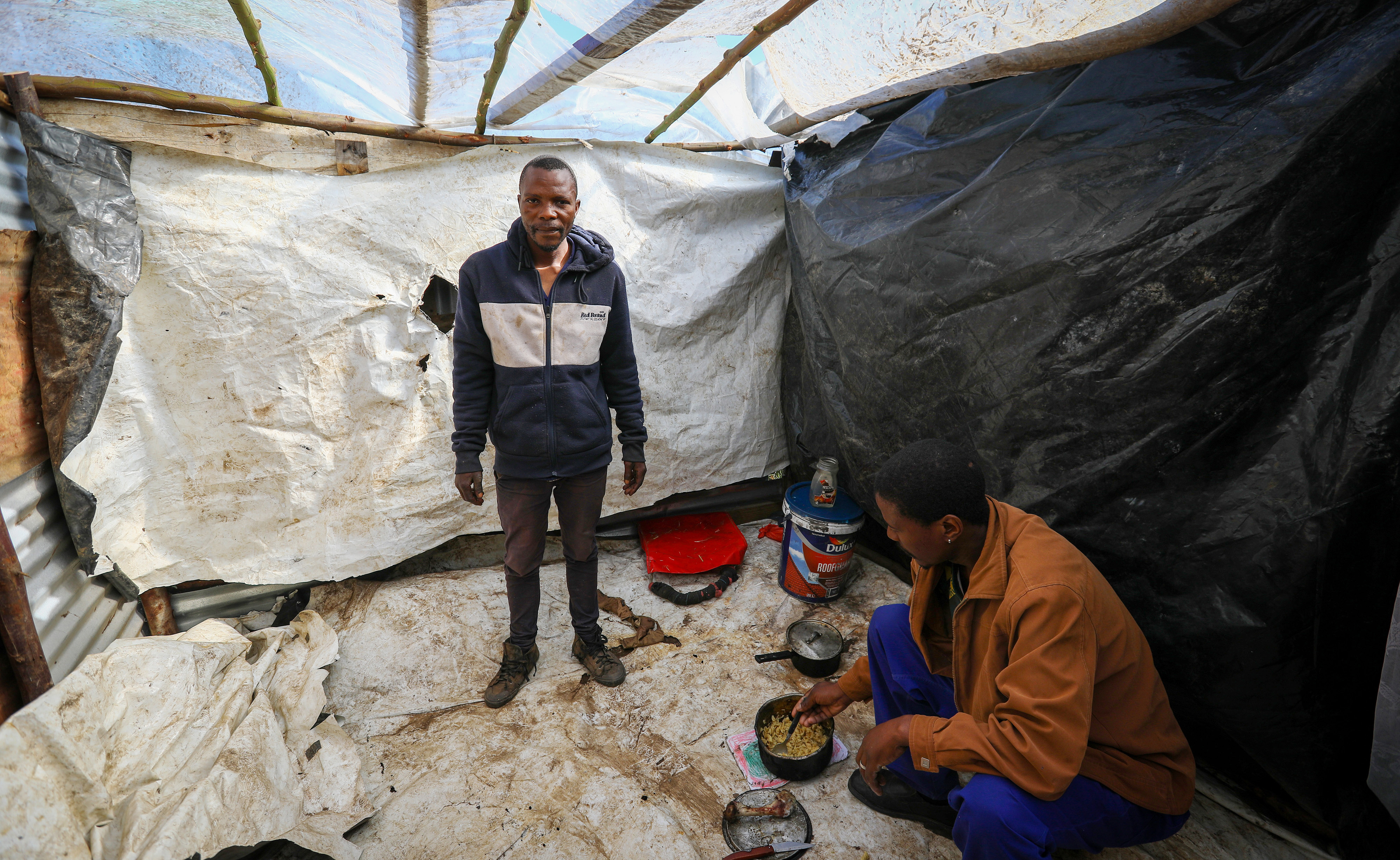 Luyanda Sithelo, 42, in his newly erected shack in Plakensplek, Swellendam. (Photo: Shelley Christians)
Luyanda Sithelo, 42, in his newly erected shack in Plakensplek, Swellendam. (Photo: Shelley Christians)
When asked about Mayor du Rand, he said, “When this mayor came in, everything good went out.”
He said that within months of Du Rand taking over as mayor after the November 2021 elections, the municipality’s indigent policy was cancelled.
“This is why people are angry; there was no consultation.”
In previous years, Setiera said, former mayors visited the informal settlements, which Du Rand had not done.
One of the issues Setiera raised was that if unemployed residents were as little as R5 in arrears, “their electricity is blocked”.
***
Many residents complained about service delivery issues involving water, refuse and sanitation in addition to the high cost of electricity.
In the Majoks informal settlement, Daily Maverick saw children in the streets during the daytime when they should have been in school.
I work with stock and earn R4 per every filled bag. I work hard every day to fill at least 20 bags so I may make R80 because jobs are limited in Swellendam.
Rubbish was strewn all over the settlement and no bins were visible. As residents do not have toilets inside their shacks, the few public toilets had rubbish littered around them.
“All I ever have is this shack and I get sick frequently because there are no services provided here,” said Passi Sombongile (41).
“We struggle since there aren’t even toilets for us… I have to go to the bush to relieve myself, which can be dangerous at night,” said Sombongile, who arrived in Swellendam just over three years ago.
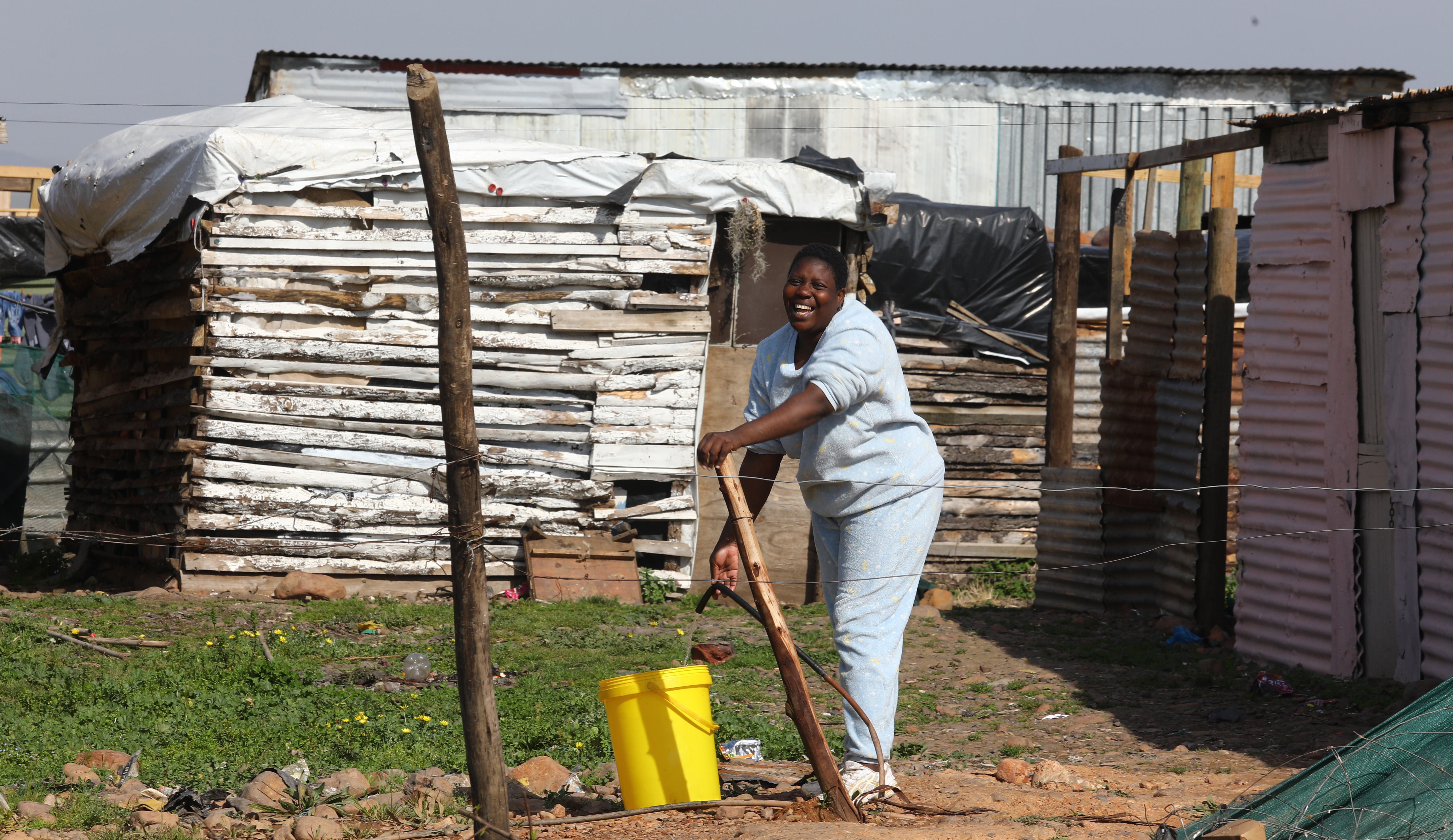 A woman collects water from a tap in Majoks, Swellendam. (Photo: Shelley Christians)
A woman collects water from a tap in Majoks, Swellendam. (Photo: Shelley Christians)
Another resident, Kgauta Mohlakoana, arrived in Swellendam after his brother said there would be job opportunities.
“I collect naartjies at the farm, and it is a seasonal work. Even the weekly stipend we receive is not enough to sustain me,” he said.
“I work with stock and earn R4 per every filled bag. I work hard every day to fill at least 20 bags so I may make R80 because jobs are limited in Swellendam, and water and power are beyond all that. There is no care for us.”
***
After the protests, a group of residents came together to create a ratepayers’ association. Its inaugural meeting was held on Tuesday, 5 September. One of the founders of the new association, Hennie Smit, spoke from his home in Suurbraak.
“[The association has] been coming along for quite some time,” said Smit, who had experience in setting up a ratepayers’ association in Calitzdorp, in the Kannaland municipality.
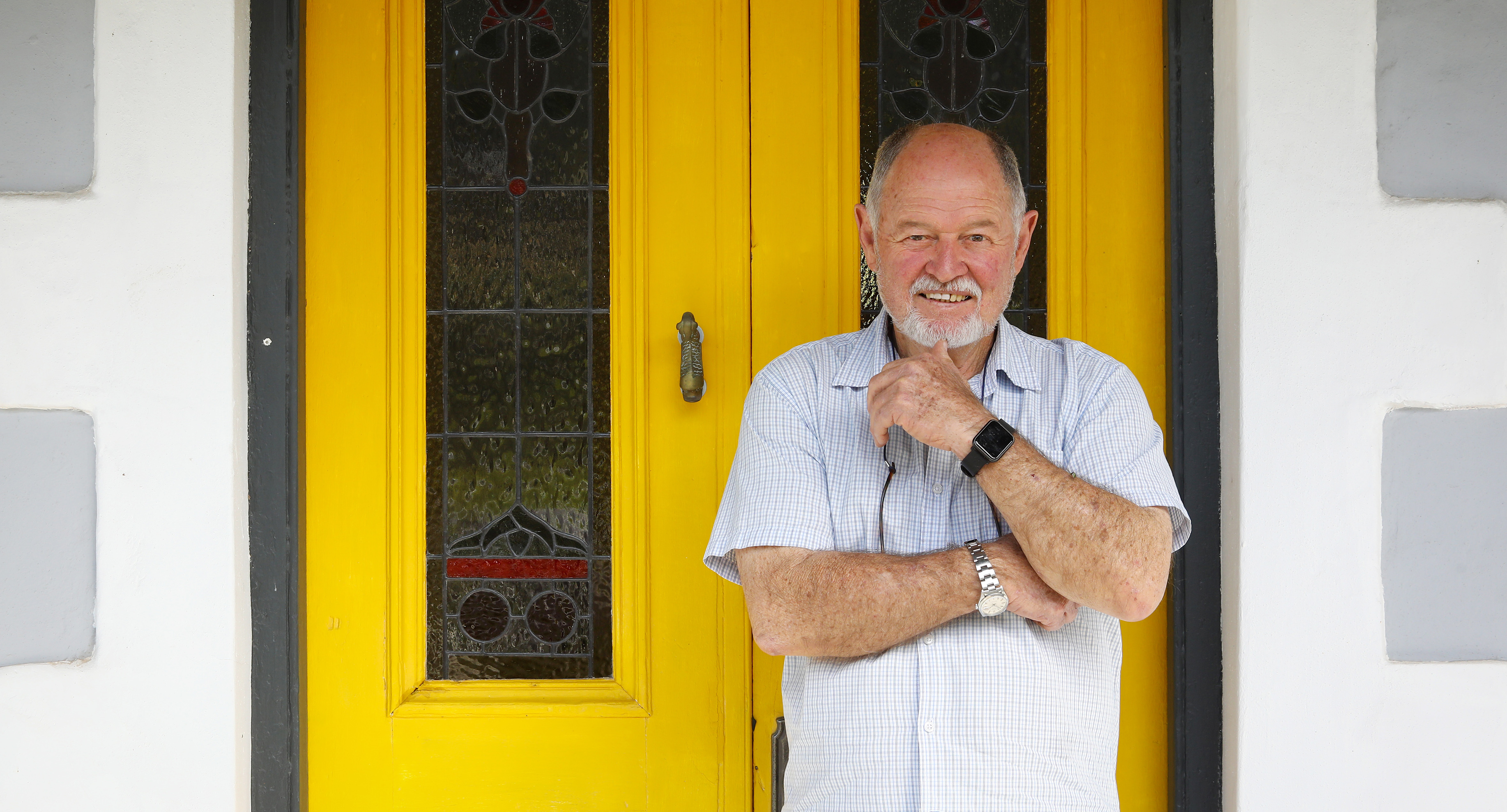 Hennie Smit is forming a ratepayers' association in Swellendam. (Photo: Shelley Christians)
Hennie Smit is forming a ratepayers' association in Swellendam. (Photo: Shelley Christians)
Smit wrote to the municipality about the indigent policy at the heart of the protest. In it, he asked what the municipality’s plan of action was for issues of growth in the informal settlements and the lack of basic services. He also questioned the comprehensive review of the indigent policy, which was tabled in the municipality’s Integrated Development Plan.
“My view was, this policy would just keep them poor. Then this incident happened,” he said.
When Daily Maverick asked Smit how he would rate the service from the municipality, his wife Mara sighed loudly and Smit laughed.
“It’s not great; I think in this particular case, it’s not great,” he said.
Besides the indigent policy, Smit said, “The refuse removal is another problem. They could have long ago started with recycling and created some jobs of that, but they just haven’t got around to that.”
While the association was aware of the challenges posed by informal settlements and the limited funding of local government, the municipality was “not coming [up] with a solution”.
“It all comes back to the municipality and the competencies it lacks. And the money is running,” said Smit, adding that the municipality lacked a proper plan of action.
He said everyone in the municipality had been invited to join the ratepayers’ association and they were collecting responses from residents to determine what was needed in specific areas.
***
After the municipal building was torched, Mayor du Rand’s office was moved to the municipality’s Infrastructure Services Department.
Du Rand said changes to the municipality’s indigent policy had involved several meetings with residents. He said some meetings were poorly attended, while others had to be postponed because of load shedding
During his 2023/2024 budget speech, tabled in May, Du Rand said there had been a “significant” amendment to the indigent policy, “to improve pensioners’ rebates”. This included exempting the first R750,000 of property value from property taxes, and a 25% rebate on basic water, sewerage and refuse service charges. Requirements for the rebate included that household income not exceed five times the social grant pension, which equalled around R10,000 per month, and that pensioners needed to be 60 years or older.
He added there were 2,010 indigent and 340 poor households in the municipality that were entitled to rebates and subsidies.
However, residents were now required to register to qualify for the rebates and subsidies.
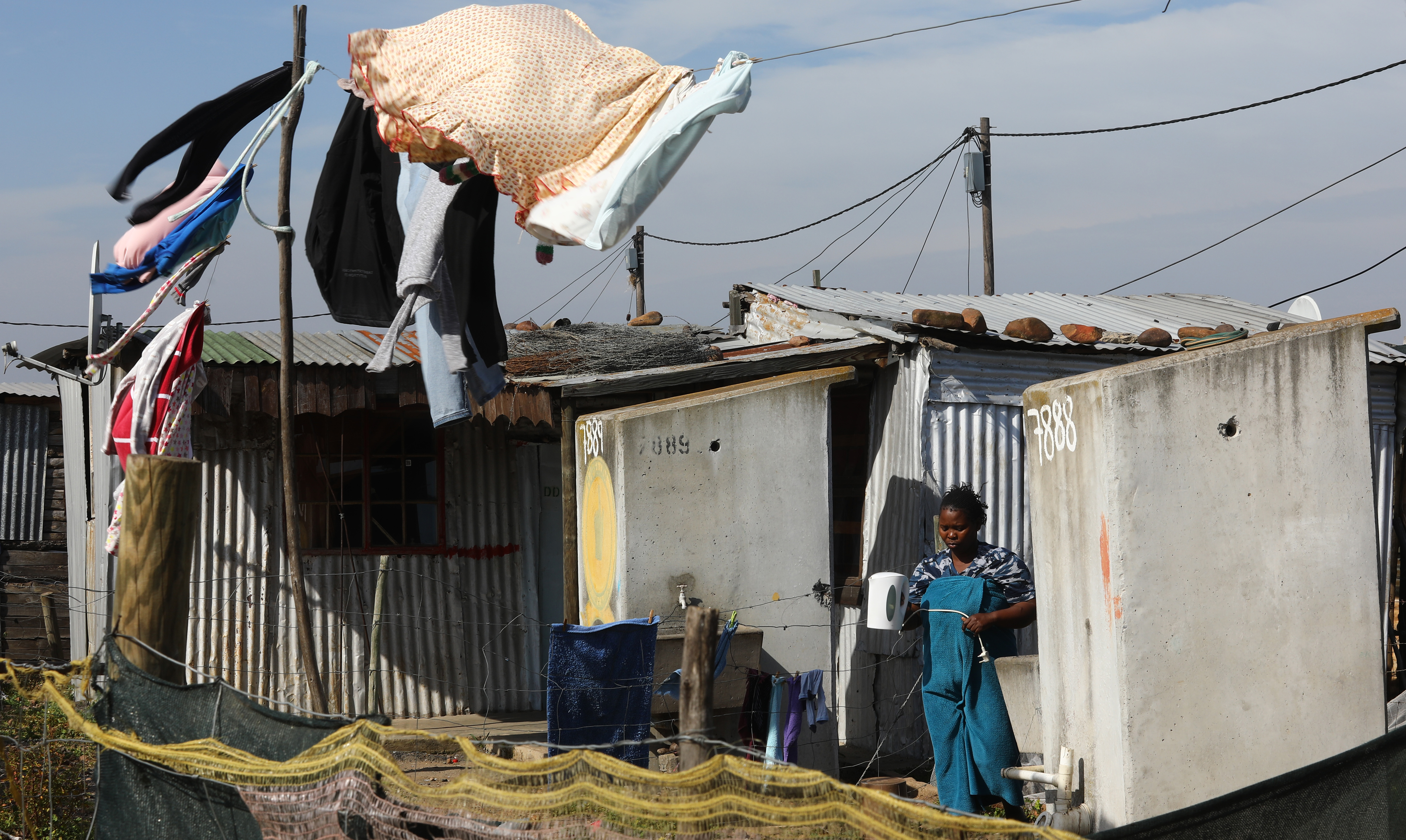 Nomikelo Ndikolo Majoks in Swellendam on 31 August 2023. (Photo: Shelley Christians)
Nomikelo Ndikolo Majoks in Swellendam on 31 August 2023. (Photo: Shelley Christians)
“A municipality’s role is to vet every application, selecting only those households that meet various criteria. Successful applicants are granted indigent status. Municipalities often run awareness campaigns to ensure households know about the application process. Indigent status isn’t for life, however,” the mayor said.
Read more in Daily Maverick: Flawed system: Political parties quiet as millions are excluded from poverty alleviation policies
The mayor said because the municipality was small, there were only a limited number of councillors. Along with Du Rand being a ward councillor, he was responsible for infrastructure as well as being mayor.
“The reason for that is I’m doing another job so we can save money.”
***
In the Swellendam municipal council, the DA has five seats, the ANC has five seats and the Freedom Front Plus has one. Currently, the DA and Freedom Front Plus govern through a coalition.
During the interview, Du Rand said ANC councillors and members were involved in the dispute over the indigent policy and in the marches.
In his response to the memorandum, he said, “We want to express our disappointment with the councillors, ward committee members and nominated representatives of the informal settlement for their dishonest behaviour, lies and inaction.”
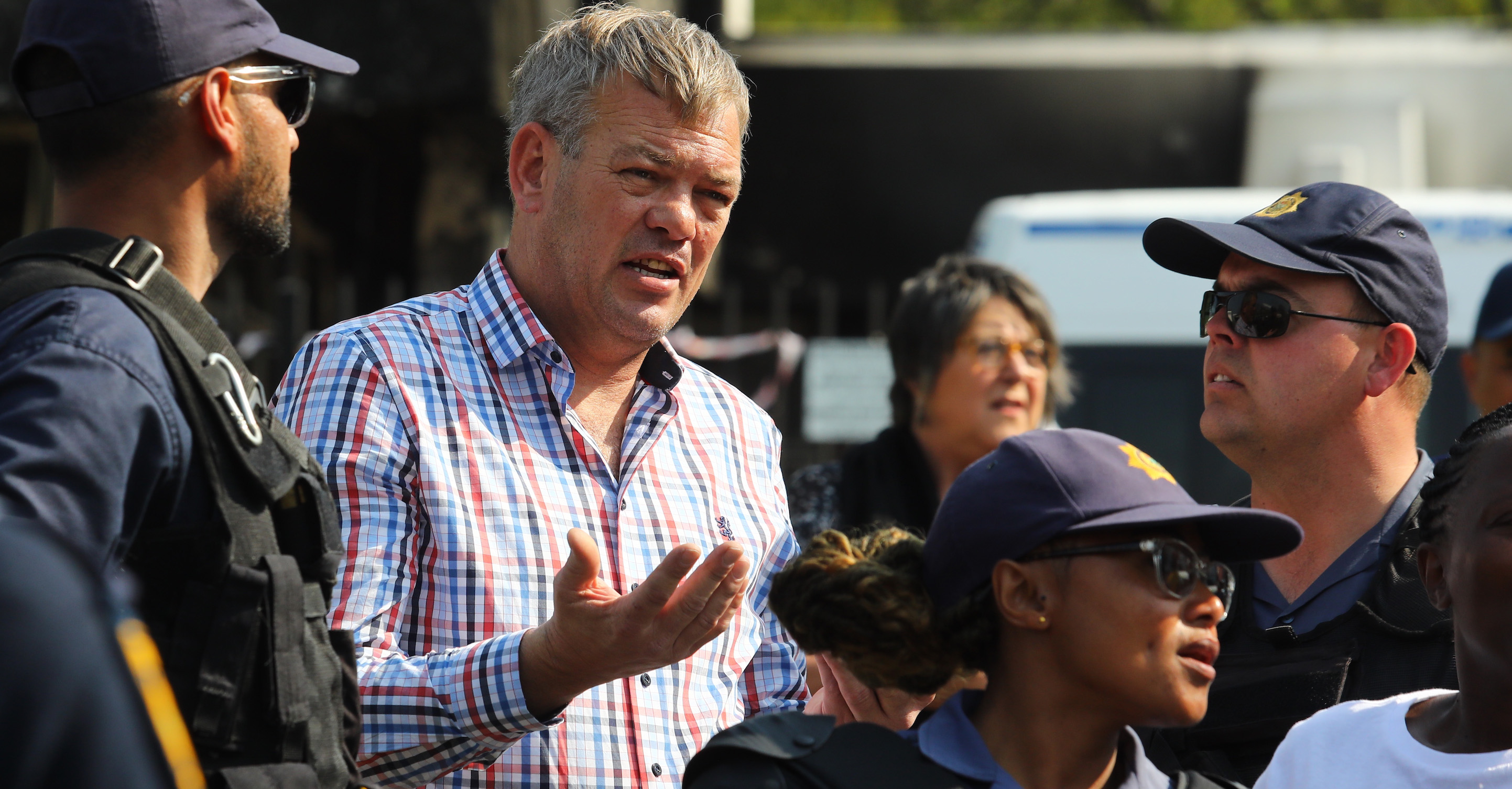 Mayor Francois du Rand stood behind the police until he accepted the memorandum handed to him by Railton residents. (Photo: Shelley Christians)
Mayor Francois du Rand stood behind the police until he accepted the memorandum handed to him by Railton residents. (Photo: Shelley Christians)
When Daily Maverick asked him to respond to some of the claims made by Smit, he shrugged and said, “He’s getting a bit irritating.”
He said Smit stood as a candidate for the Freedom Front Plus for Ward 4 and for the municipal mayorship in the 2021 local government elections, losing to Du Rand in both.
“You can try your best but you can never win,” said Du Rand about criticism from both sides of the municipality — its affluent area and those living in the informal areas.
“That’s fine, it comes with the job.” DM




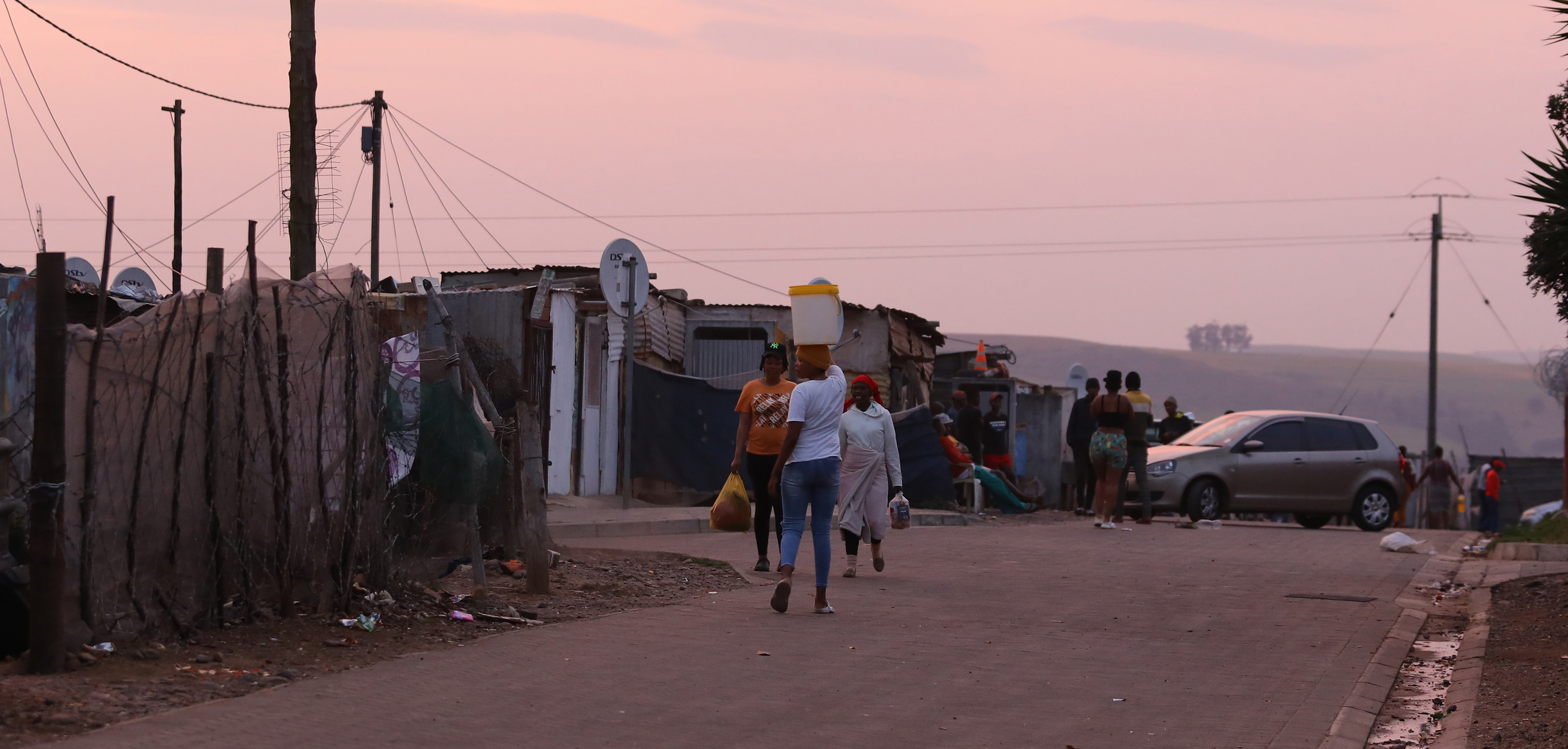 Mayor Francois du Rand stood behind the police until he accepted the memorandum handed to him by Railton residents. (Photo: Shelley Christians)
Mayor Francois du Rand stood behind the police until he accepted the memorandum handed to him by Railton residents. (Photo: Shelley Christians)